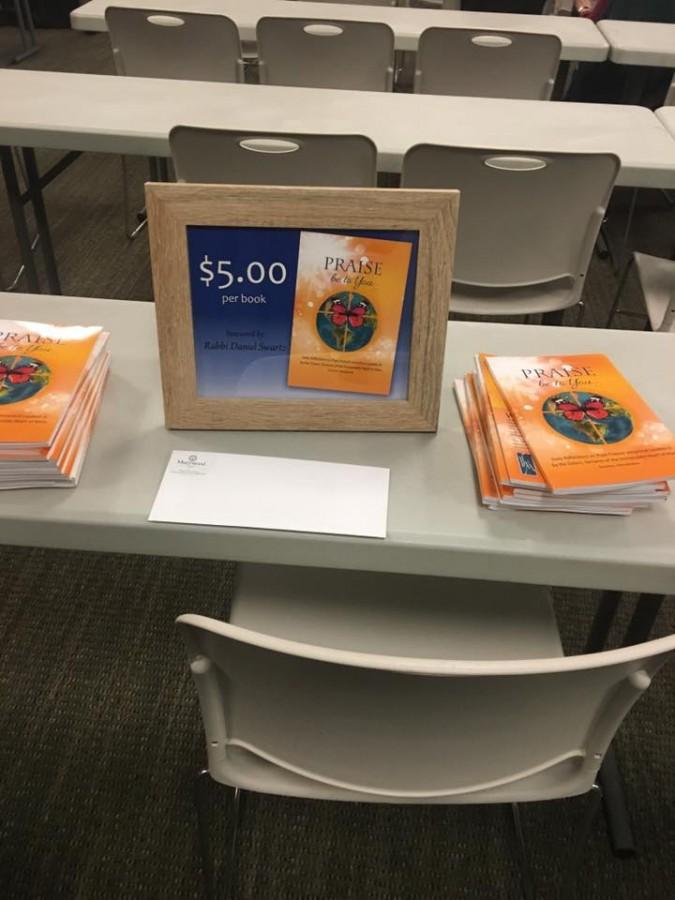When faiths collide: Local rabbi held lecture on Pope Francis’ encyclical
Photo credit/ Amanda Duncklee
February 5, 2016
Pope Francis may just be the most influential pope in recent history, and his impact has reached Marywood.
The Argentinian leader of the Catholic Church released his encyclical, “Laudato si’: On Care for Our Common Home,” on May 24, 2015, and his words promoting care for the environment as well as the most vulnerable of humanity struck a chord with many people. The full text of the encyclica can be found here.
Marywood is no exception to the hype that surrounded the pope’s words. On Wed. Jan. 3 at 6 p.m. in the McGowan Community Room of the Swartz Center for Spiritual Life, Rabbi Daniel Swartz led a lecture that discussed the encyclical and the “responsibility as global citizens to care for the poor and our environment,” according to the Marywood University Event Calendar.
Swartz has been the Spiritual Leader at Temple Hesed in Scranton since August 2006. Prior to his leadership role, Swartz worked in social justice for nearly a decade and continues to. He received degrees in geoscience and environmental policies, according to Mary Ann Smith, the Lab Instructor in the Science Department and host of the event.
“Since it’s come out, this is probably the 15th talk I did on ‘Laudato si’,'” said Swartz. “It’s very exciting getting discussions about the environment on college campuses. People are excited about this.”
All Marywood community members were welcome to the open forum. IHM sisters prepared a text of reflections on the chapters of “Laudato si'” that were available for $5, and the books were placed on a table by the door for attendees.
Mary Ann Smith, the lab Instructor in the science department, hosted the event.
“The purpose of tonight is to begin the conversation on changes the world needs,” began Smith. “We know the world needs change, but we don’t always think about our own impact… this [lecture] kindles a fire and sparks conversation about how we can care for one another.”
After her introduction, Smith played a video distributed by Center of Concern, a group that analyzes and addresses social issues from a Catholic perspective. The video displayed excerpts from “Laudato si'” and corresponding images. Following the video, Smith introduced Rabbi Daniel Swartz.
“It is wonderful to see that across faith traditions, we don’t sit in the front row,” joked Swartz. Throughout the lecture, Swartz noted that many of the problems the world faces today stem from a lack of empathy for others as well as apathy toward the environment and its well being.
“We tend to think of the environment as whales and wilderness,” said Swartz. “We need to shift that view. Environment is our common home where we live, work, learn, play and pray.”
Swartz emphasized that what is done to the environment effects the most vulnerable of world: people in poor nations who cannot afford to undue environmental havoc wrought upon the earth. He predicted that environmental issues are “going to be the nexus of social justice for the next century, at least.”
Swartz used the example of who designates locations for dumpsites and landfills verses who suffers the repercussions of landfills in their homes.
“It’s not just where we dump things; it’s who profits,” said Swartz. “We put things where people can’t fight back… the economic gain of those who exploit the planet does not go to those exploited.”
Swartz discussed how climate change affected areas such as Florida and Bangladesh. According to Swartz, resources better equip one area over the other in the face of water levels rising by five meters.
“The same sea level rise can very differently affect these areas,” said Swartz. “Who’s better off: Miami City and Panama City, or Bangladesh, where some of the poorest parts in the world are?”
For the latter part of the lecture the audience analyzed a handout with Swartz. Swartz had texts from “Laudato si'” printed on the left side of the pages and texts from a variety of Jewish texts on the right side of the pages.
After reading “Laudato si’,” Swatz realized that many of the texts in the encyclical related to texts throughout other faiths.
“Each religion has something in common,” said Swartz. “That’s what’s there to pull us all together.”
Swartz took questions at the end of the lecture, and many in the crowd were eager to share their insights.
Sr. Catherine Luxner, IHM, Director of Campus Ministry, helped facilitate the event and was pleased by the outcome.
“I thought it [the lecture] was fantastic. I loved the connection between “Laudato si'” and Hebrew,” said Luxner. “All faiths can be working together for this common problem that is not just a religious issue. There’s a lot of stuff we need to think about.”
This event was the first in a series focusing on the environment. There will be a panel discussing “Laudato si'” on March 2 at 6 p.m. and a discussion during Earth Week on caring for the Earth on April 20 at 6 p.m.
Said Sr. Catherine, “I hope others will join us.”
Contact the writer: [email protected]
Twitter: ADuncklee_TWW





